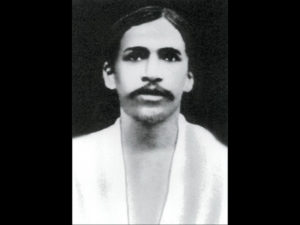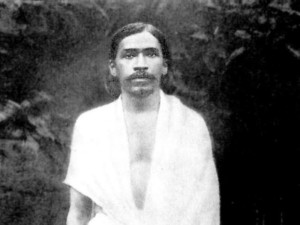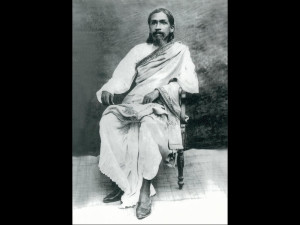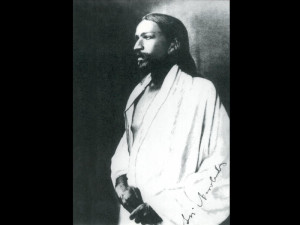Category Archives: Spirituality
Synthesis of Yoga Pt. 1, Ch. 10
This reading concludes Chapter 10, The Three Modes of Nature. Sri Aurobinido began the chapter outlining precisely what are the three modes, their influence on our nature and our goal to become one with the Divine. In this second half of the chapter he goes on to instruct us that getting rid, rejecting, if that were even possible, what would appear to be holding us back or down, that any attempt at an exclusive resort to sattwa as the sought after highest of the three gunas, seeming to be the way of escape, won't do. As no one of the qualities can prevail by itself against the other two.
Again, the Gita: to stand back in oneself from the action of the of the modes, and to observe as the Witness, seated above the forces of Nature. The Witness looks but neither accepts nor interferes. Achieving a static freedom of the soul, no longer only witness, a dynamic transformaton of the nature takes place.
Synthesis of Yoga Pt. 1, Ch. 10
The Three Modes of Nature, chapter 10, page 232, begins with an explanation of these three modes, their qualities, their workings.
These modes, termed gunas in Indian books, are named as sattva, rajas, tamas. No man is entirely one or another: Sri Aurobindo points out that all three are present in everyone and, everything; a constant combining, separating of their relations is in play.
In detail each guna is explained. One's dominant guna is not the soul type of the individual but rather an index made for the present existence, at the particular moment of his evolution in Time.
Selections par Gangalakshmi 204
Une série hébdomadaire de lectures par Gangalakshmi (en Français) de sélection d?oeuvres sur ou de la Mère et Sri Aurobindo, qui lui semble La Manifestation Supramentale.
A weekly series of readings by Gangalakshmi (in French) from selected works by or on the Mother and Sri Aurobindo.
This week Savitri by Sri Aurobindo Livre IV, Chant III L'Appel de I'Inconnu
On the special request from listeners this edition is un cut!!!
Savitri, B. II, C. XIII
Savitri, Book II, The Book Of The Traveller Of The Worlds, Canto XIII, In The Self Of Mind, Pages 283 - 288
King Aswapathy reaches the silent Self of Mind at the summit of the mental worlds and feels that he has arrived at his goal. But a ray of light falls upon all things seen or touched or heard or felt, and showed his mind that nothing could be known. He must reach "That", the true source of all knowledge. Sri Aurobindo poetically describes and destroys all the value of the planes of Mind which the traveler has been through so far, and the immortal spirit of the king is imprisoned in a world where all must die to live and live to die.
Selections par Gangalakshmi 206
Une série hébdomadaire de lectures par Gangalakshmi (en Français) de sélection d?oeuvres sur ou de la Mère et Sri Aurobindo, qui lui semble La Manifestation Supramentale.
A weekly series of readings by Gangalakshmi (in French) from selected works by or on the Mother and Sri Aurobindo.
This week Savitri by Sri Aurobindo Livre V, Chant II Satyavane.
On the special request from listeners this edition is un cut!!!
Synthesis of Yoga Pt. 1, Ch. 9
Continuing with part 1 the Yoga of Divine Works, Chapter 9 Equality and the Annihilation of Ego on page 226 through its conclusion on page 231.
Sri Aurobindo explains that for we must grow into equality of spirit; there is a stoical period of preparation of equality in which we learn not to run from that which pains nor run towards that which pleases, but to accept, face, bear and conquer. He calls this period a most elementary and yet a heroic age. This period of resignation and endurance shall result in the soul's strength, equal to all shocks and contacts.
The follower of this Path will finally realize him/herself as the conscious instrument of the eternal Worker, having renounced, surrendered fully to the supramental Shakti his works as well as the fruits of his works.
Synthesis of Yoga Pt. 1, Ch. 9
Chapter IX starting on page 221: Equality and the Annihilation of the Ego, in which Sri Aurobindo again extols the simple yet profound teaching of the Gita: "To action thou hast a right but never under any circumstances to its fruit."
" . . . the renunciation of attachment to the work and its fruit is the beginning of a wide movement towards an absolute equality in the mind and soul." To act, work with attachment to the result means our work is not offered to the Highest, but to our ego.
He continues, reminding us that the Lord is there equally in all beings: the wise and the ignorant, friend and enemy, man and animal, saint and sinner; and so to hate none, despise none, be repelled by none. in the God-nature to which we must, indeed shall rise, there can be a calm, forceful rejection but not repulsion, scorn nor dislike. Because in all we have to see the One . . . all is ourself, one self that has taken many shapes . . . we shall have equality of soul towards the ugly and the beautiful, the maimed and the perfect, the noble and the vulgar, the good and the evil, since all things are the one Self in its manifestation.













